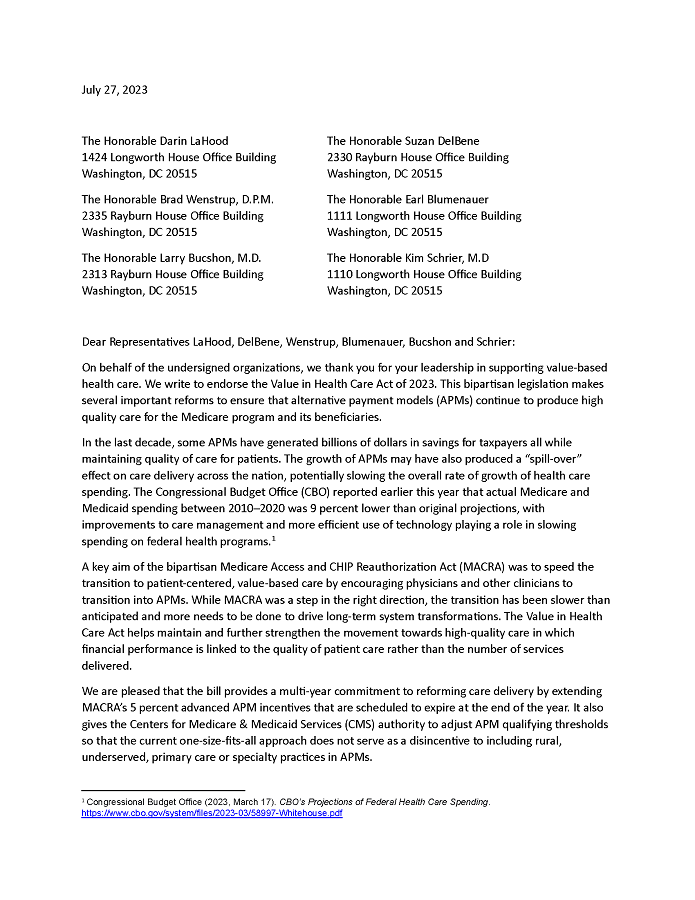

AHA Letter in Support of the Value in Health Care Act of 2023
July 27, 2023
The Honorable Darin LaHood
1424 Longworth House Office Building
Washington, DC 20515
The Honorable Brad Wenstrup, D.P.M.
2335 Rayburn House Office Building
Washington, DC 20515
The Honorable Larry Bucshon, M.D.
2313 Rayburn House Office Bulding
Washington, DC 20515
The Honorable Suzan DelBene
2330 Rayburn House Office Building
Washington, DC 20515
The Honorable Earl Blumenauer
1111 Longworth House Office Building
Washington, DC 20515
The Honorable Kim Schrier, M.D.
1110 Longworth House Office Building
Washington, DC 20515
Dear Representatives LaHood, DelBene, Wenstrup, Blumenauer, Bucshon and Schrier:
On behalf of the undersigned organizations, we thank you for your leadership in supporting value-based health care. We write to endorse the Value in Health Care Act of 2023. This bipartisan legislation makes several important reforms to ensure that alternative payment models (APMs) continue to produce high quality care for the Medicare program and its beneficiaries.
In the last decade, some APMs have generated billions of dollars in savings for taxpayers all while maintaining quality of care for patients. The growth of APMs may have also produced a “spill-over” effect on care delivery across the nation, potentially slowing the overall rate of growth of health care spending. The Congressional Budget Office (CBO) reported earlier this year that actual Medicare and Medicaid spending between 2010–2020 was 9 percent lower than original projections, with improvements to care management and more efficient use of technology playing a role in slowing spending on federal health programs.1
A key aim of the bipartisan Medicare Access and CHIP Reauthorization Act (MACRA) was to speed the transition to patient-centered, value-based care by encouraging physicians and other clinicians to transition into APMs. While MACRA was a step in the right direction, the transition has been slower than anticipated and more needs to be done to drive long-term system transformations. The Value in Health Care Act helps maintain and further strengthen the movement towards high-quality care in which financial performance is linked to the quality of patient care rather than the number of services delivered.
We are pleased that the bill provides a multi-year commitment to reforming care delivery by extending MACRA’s 5 percent advanced APM incentives that are scheduled to expire at the end of the year. It also gives the Centers for Medicare & Medicaid Services (CMS) authority to adjust APM qualifying thresholds so that the current one-size-fits-all approach does not serve as a disincentive to including rural, underserved, primary care or specialty practices in APMs.
We are also encouraged that the bill removes revenue-based distinctions that disadvantage rural and safety net providers, which is critical to improving access to care and improving health equity. The bill also improves financial benchmarks so that APM participants are not penalized for their own success. To allow more clinicians to continue the transition to value, the bill establishes a voluntary track for accountable care organizations (ACOs) in the Medicare Shared Savings Program to take on higher levels of risk and provides technical assistance for clinicians new to APMs. Lastly, the bill seeks to explore the potential of providing parity between APMs and the Medicare Advantage (MA) program by studying ways to increase alignment that will ease burdens on physicians and ensure that both APMs and MA are atractive and sustainable options.
Thank you for your leadership on these important issues. This bill is a comprehensive approach that will strengthen the Medicare program and ensure high quality, lower cost care for our nation’s seniors. We look forward to working with you.
Sincerely,
Accountable for Health
American Academy of Family Physicians
American Academy of Orthopaedic Surgeons
American College of Physicians
American Hospital Association
American Medical Association
America’s Essential Hospitals
America’s Physician Groups
AMGA
Association of American Medical Colleges
Federation of American Hospitals
Healthcare Leadership Council
Health Care Transformation Task Force
Medical Group Management Association National Association of ACOs
National Rural Health Association Premier, Inc.
- Congressional Budget Office (2023, March 17). CBO’s Projections of Federal Health Care Spending. https://www.cbo.gov/system/files/2023-03/58997-Whitehouse.pdf


